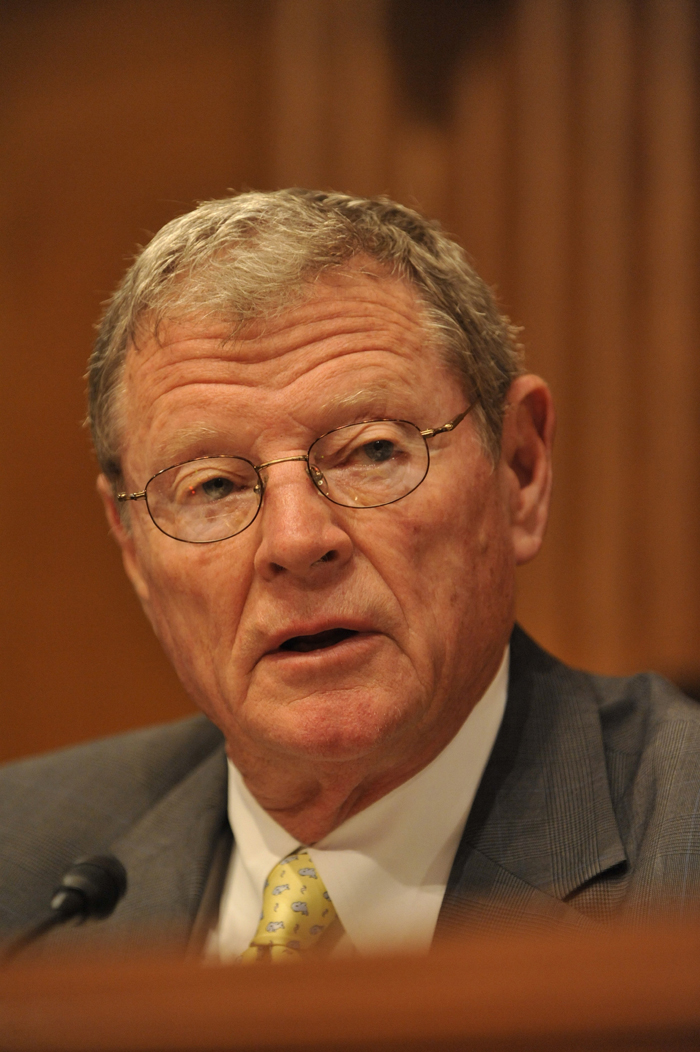Did Sen Jim Inhofe (R-OK) — the leading global-warming skeptic in Congress, who has repeatedly called man-made global warming or even global warming itself a hoax, and accused scientists of manipulating data — himself falsely represented poll data on American public opinion?
Earlier this week, Inhofe published an op-ed piece in USA Today, reviewing his visit to the Copenhagen conference. “The bottom line is this: The American people have caught on to the significant flaws of cap-and-trade policy,” Inhofe writes. “The Washington Post released a poll on Friday showing ‘growing negativity toward the president’s handling of the broader global warming issue.’ Approval has plummeted from 61% last spring to 45% last week. Given the state of the American economy, it is hardly surprising that the American public is growing restless with policies that would put more Americans out of jobs and raise the cost of energy.”
The problem is this: The poll doesn’t say that people are against policies that would raise the cost of energy — in fact, it says quite the opposite. Even odder, there were other numbers in the poll that Inhofe could have picked out, but didn’t, if he’d wanted to undermine the political credibility of climate science. And yet he didn’t even mention those.
The poll did indeed show a decrease in approval on President Obama’s handling of this issue, compared to his honeymoon period in the spring (though the 45% approval was still a plurality, against 39% disapproval).
More importantly, the poll didn’t ask specifically about cap-and-trade policy, but did ask a more general question: “On another subject, do you think the federal government should or should not regulate the release of greenhouse gases from sources like power plants, cars and factories in an effort to reduce global warming?” Here the answer was 65% yes, 29% no, only down slightly from a 75%-22% figure in June.
The poll was then split into half-samples, who were then asked whether they would still support regulation of greenhouse gases even if it cost them an extra $10 per month, or $25 per month, in their energy expenses. The $10 per month sample supported it 60%-37%, the $25 per month sample was in favor of regulation by 55%-42%.
The numbers that Inhofe could have sampled asked people how much they trust the things that scientists say about the environment: 29% trust them “completely” or “a lot,” 30% trust them moderately, and 40% say only “a little” or “not at all.” Another question asked whether people think most scientists agree with one another on whether global warming is happening, or if there’s disagreement: 36% say most agree, to 62% who think there is a lot of disagreement.
In an interview with TPM, Inhofe’s spokesman Matt Dempsey argued with my interpretation of the poll. After Dempsey had told me to read the poll again, a lot of news intervened between the time I could check again and then call him back (you might recall there was a Senate vote going on). He then argued with the fact that it took hours for me to call back.
“Well how did you read the poll? What does the poll say to you? What were the questions?” Dempsey said, also adding: “Your analysis and what I’m going to look at are probably two different things.”
Again, I restated the point that the issue is that Inhofe said a poll shows the American people rejecting policies that would raise their energy costs, when on close examination it says the opposite. “That is not true. Sen. Inhofe stands 100 percent behind his comments in USA Today. The American people have rejected cap and trade,” said Dempsey, citing votes in the Senate since the 1990s and up through recently, in which regulations were rejected.
“This poll is another indication that the American people soundly reject cap and trade legislation,” Dempsey said strongly. “I stand 100 percent behind that.”









